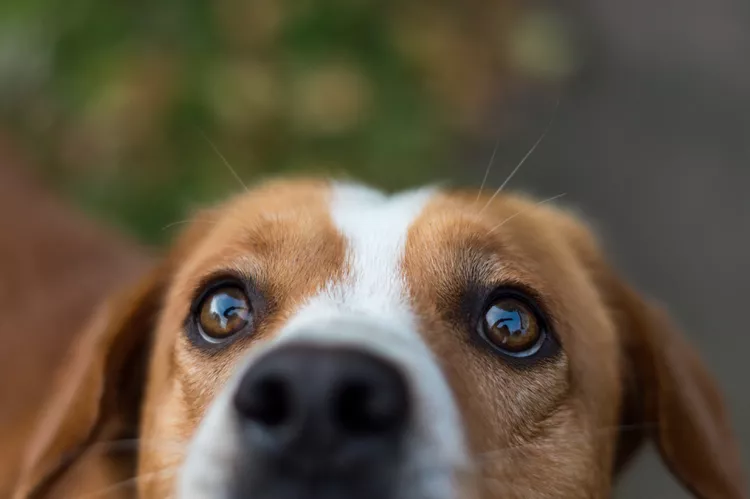Eye Injuries and Infections in Dogs

Dog eye injuries can be tough to avoid if your pup lives an active lifestyle. Rough play, exploring brushy woodlands, digging, or looking out an open car window are all activities that put dogs' eyes at risk of irritation or serious injury. Minor abrasions on the surface of the eye aren't usually a big deal, but any eye damage can become infected and may threaten the dog's vision. Whether it's "just a scratch" or a dog eye infection, a visit to the vet may help save your furry friend's eyesight.
What Is a Dog Eye Injury?
An eye injury is any physical trauma to the eye. Common eye injuries include corneal laceration (cut or scratch to the eye surface), corneal ulcer (from chemicals, debris, or excessive rubbing), puncture wound (from any foreign object), eyelid trauma, or proptosis (when the eye pops out of its socket).
Symptoms of Eye Injuries in Dogs
Many different eye diseases can affect dogs. Ocular symptoms can arise even without an injury. However, if your dog's eye has a noticeable wound on or around it, perhaps accompanied by blood, it's a good idea to visit the vet.
Even if you don't see an obvious wound or irritating particle in your dog's eye, signs of a problem may be as subtle as squinting, twitching, or spasms of the eyelid. Your dog may scrape its paw over the injured eye, blink rapidly, or experience excessive tearing.
Some injuries may affect your dog's ability to open its eye entirely. A bloodshot appearance in the white of the eye may indicate trauma or irritation. A yellow or greenish discharge can signal an infection, which may occur as a result of an injury.
Other types of eye problems can cause redness of the mucosal membrane surrounding the eye, cloudiness in the eyes, prolonged pupil dilation, an asymmetrical appearance of the eyes, and light sensitivity. Signs may be present in one or both eyes, which can sometimes confirm the presence of an injury versus a different issue.
If you notice your dog experiencing any of these symptoms, seek veterinary attention as soon as possible. Do not attempt home care for eye problems unless advised to do so by a professional. Since eye problems can be much worse than they look—and can progress very rapidly—don't risk your dog's vision or tolerance for pain.
Causes of Dog Eye Infections or Injuries
An eye injury occurs when something comes into contact with your dog's eye and causes damage. These events may include:
- A dog fight or altercation with another animal
- A cat scratch
- A kick from a horse or other livestock
- Contact with brush or branches
- Insect bites
- Debris blowing past a moving car (if the dog rides with its head out the window)
- Lawn chemical exposure
- Contact with a sharp object
- Self-inflicted injury (pawing, rubbing) due to itchy eyes, allergies, or other irritation
Diagnosing Eye Injuries in Dogs
Your veterinarian will examine your dog's eye using an opthalmascope to illuminate the eye and check for obvious damage or debris. If needed, a Schirmer tear (STT) will assess tear production, and your vet may also measure the intraocular pressure of the eye.
If your dog's eye injury is severe, your vet may refer you to a veterinary ophthalmologist for specialized care.
Treatment
Depending on the diagnosis, a simple treatment of eye medication (antibiotic/anti-inflammatory ointment) and a follow-up exam may be recommended. Dogs with eye injuries may need to wear an E-collar (cone) or other dog recovery wear to prevent pawing or rubbing at the eye. The collar will also help protect the eye from hazards around the home.
Severe injuries may require surgery, which will be performed by an ophthalmologist.
Prognosis for Dogs with Eye Injuries
If treated with the appropriate medication to prevent infection and heal injured tissue, a dog's eye will usually heal without lasting damage or vision loss. More severe injuries may leave scarring or impair a dog's vision for life.
How to Prevent Eye Injuries
Accidents happen, but you can take steps to help keep your dog safe and prevent injury. Because most injuries occur outdoors, supervise your dog at play, especially in areas with branches and brush or dense grass. Don't allow your dog to roam free since there is no way to protect it from injury while it's out of your sight. Lastly, while many dogs enjoy sticking their heads out in the wind while riding in a car, it's safest to not to allow this behavior.